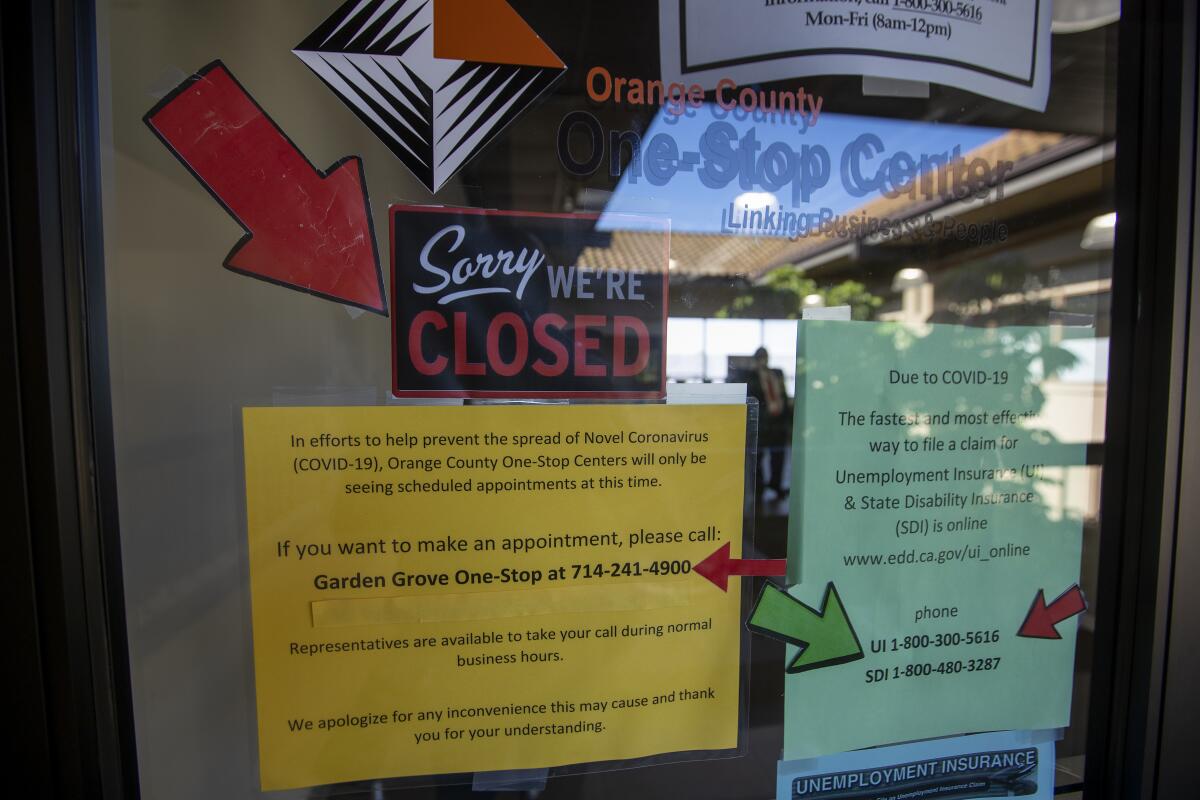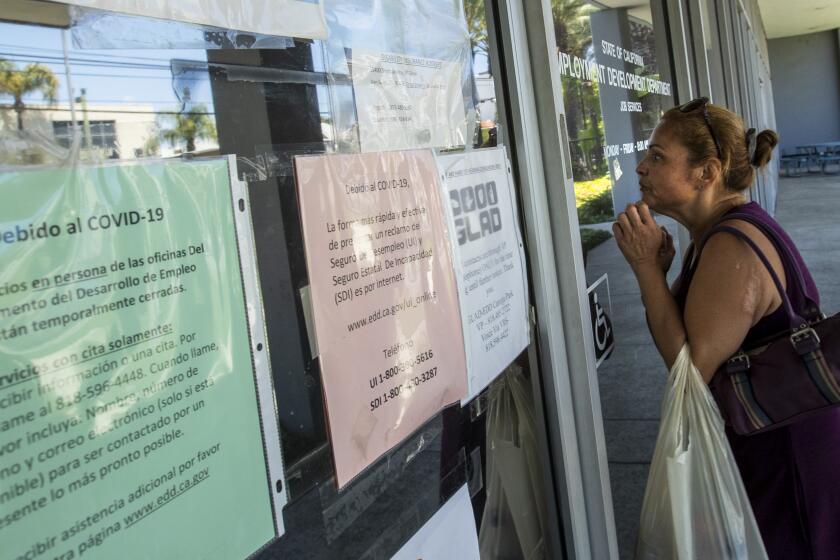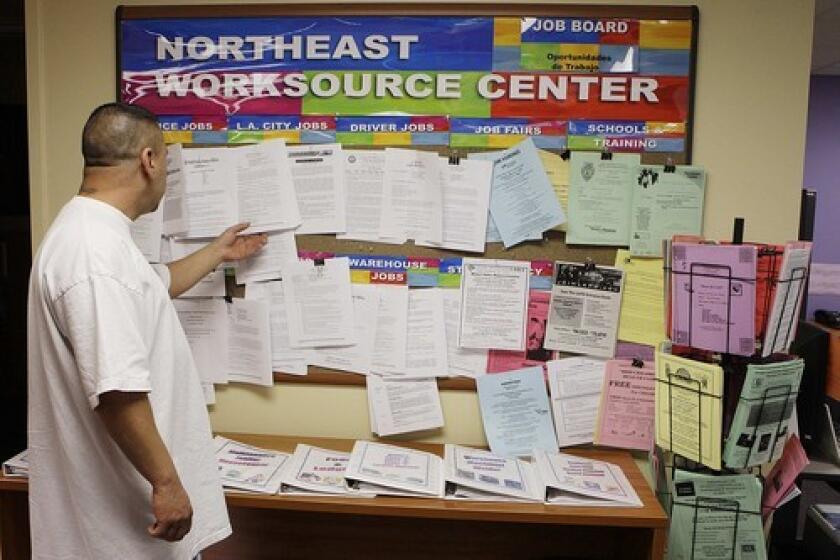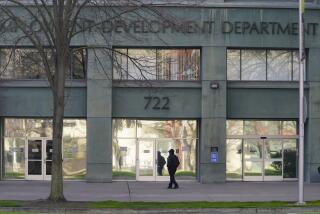Scammers could be targeting unemployment benefits in California, state warns

- Share via
SACRAMENTO — Many Californians are anxiously waiting for unemployment benefits during the COVID-19 pandemic, but James Myers was not happy when he received a letter from the state notifying him that his application for assistance had been approved.
The Folsom tech engineer has a job and has not applied for financial assistance from the California Employment Development Department, putting him among the thousands of Americans affected each year by unemployment fraud, a crime experts say is on the rise along with job losses across the country in an economy battered by the spread of the coronavirus.
“I freaked out because somebody’s obviously got my identity,” said Myers, who works for Micron Technology, Inc. “I jumped all over it. I canceled things and put a credit hold on. I filed a police report.”
Myers tried to report the error to the EDD by phone, including calling its fraud hotline, but could not reach a person. So he submitted the information to the agency online and has not heard back.
“I have no idea, if I were to lose my job, if I’d be able to collect unemployment,” Myers said. “It’s probably going to be all screwed up.”
California’s unemployment agency has processed an unprecedented 9.7 million claims from people who lost jobs or work hours since March — more than double the number filed during the worst year of the Great Recession — and has paid out $59.8 billion in jobless benefits since the pandemic began.
As California grapples with a deluge of requests for unemployment benefits during the pandemic, government workers tasked with processing claims say they are hampered by outdated technology, bureaucratic red tape and a shortage of trained staff.
To accommodate the demand, the Employment Development Department has been forced to dedicate a large portion of its staff to processing claims, and just 27 sworn officers are assigned to investigate fraudulent applications.
But scammers across the country are taking advantage of the current economic crisis and the pandemic in committing unemployment fraud. With limited resources to guard against it, California’s jobless claims process is probably at risk for exploitation.
On Thursday, the EDD put out an alert warning Californians of potential fraudulent activity involving unemployment insurance in the state.
“Because of suspicious claim activity spotted in UI programs in California and across the country, the EDD is actively involved in a nationwide investigation in conjunction with our federal law enforcement partners,” the agency said.
Armen Najarian, chief identity officer at the email security company Agari, said unemployment fraud is skyrocketing across the country.
“It certainly is at a level that we have never seen before,” he said.
Fraud schemes recently discovered in Washington and Maryland are estimated to have targeted more than $1 billion in benefits, said Jon Coss, an anti-fraud expert and vice president at technology consulting company Thomson Reuters who has done work for the California EDD and currently provides consulting services to other states.
“If you look at the dollars associated with fraud in the unemployment insurance program, I’ve never seen anything like it, and I’ve been doing this for over 30 years,” Coss said.
A majority of the California Legislature calls on Newsom to immediately begin paying unemployment benefits to more than 1 million jobless workers.
Eva Velasquez, CEO of the Identity Theft Resource Center, a San Diego nonprofit that helps fraud victims throughout the U.S., said her organization has so far received 400 calls from victims of unemployment insurance fraud — up from 19 last year.
The stakes got higher for fraudsters when Congress approved an extra $600 per week for unemployment benefits that began in April, she said.
“That $600 [weekly benefit] actually made this a much more lucrative crime for the thieves,” Velasquez said.
She also noted that scammers are taking advantage of streamlined unemployment certification processes in many states that allow those who have lost jobs to receive their benefits more quickly.
People who file unemployment claims in California must verify their identity and periodically certify that they are still unemployed. However, when the system bogged down in April and jobless Californians flooded the state with complaints, the EDD temporarily suspended a requirement for applicants to certify eligibility.
EDD spokeswoman Loree Levy said she could not provide the number of complaints called into the EDD’s fraud hotline this year. She said details about the national investigation involving her agency were confidential and declined to say if it was related to a fraud ring that security experts have dubbed “Scattered Canary,” which involves scammers from West Africa who use personal information leaked in major corporate data breaches to flood U.S. employment agencies with hundreds of fraudulent claims.
“The moment that these unemployment payments became available, this was the great new hunting ground for Scattered Canary, and they very quickly shifted focus to exploiting the billions of dollars that became available,” Najarian said.
On Wednesday, a spokesman for the U.S. Secret Service said authorities “have identified criminal actors targeting state unemployment insurance program funds” and noted that stolen personal information was used to file fraudulent claims.
California lawmakers dismissed a plan by Gov. Gavin Newsom that would take two months to resolve a backlog of nearly 1 million unemployment benefit claims, warning at a legislative hearing that many jobless people are already struggling to pay for food and rent.
A recent alert by the agency warned of fraudulent activity in states including Washington, North Carolina, Massachusetts, Rhode Island, Oklahoma, Wyoming and Florida, according to media reports.
A representative for the Secret Service declined to comment on whether California has been targeted, saying the agency does not discuss matters related to ongoing investigations. Representatives for the FBI and U.S. Department of Labor also declined to comment.
Unemployment fraud was a problem in California even before the pandemic. On July 7, the U.S. attorney’s office in Los Angeles announced that a federal grand jury had indicted eight people in a scheme that stole $1.1 million in unemployment benefits through sham corporations. Prosecutors alleged that from 2013 to 2016, those arrested registered fake cleaning companies and boutiques with the California EDD and submitted claims for phony employees, including prison inmates.
After receiving debit cards from the EDD loaded with unemployment insurance benefit funds in the names of phony employees, the defendants allegedly withdrew money in the name of those other claimants, the indictment alleges.
In a separate scheme, authorities announced on March 19 that a former EDD tax compliance representative had been sentenced to six years in prison for conspiring with five other people to obtain $887,199 in California unemployment benefits based on fraudulent claims.
The former EDD worker obtained personal information on workers that was used to file 269 fraudulent unemployment claims in 2015 and 2016, according to Quentin Heiden, special agent-in-charge of the U.S. Department of Labor Office of Inspector General, Los Angeles Region.
Meanwhile, the U.S Department of Labor recently issued an alert on bogus claims, warning that “fraudsters are perpetrating numerous schemes related to the COVID-19 pandemic.” The federal agency said in June that it stopped payment on nearly 3,800 fraudulently filed unemployment insurance claims, including 1,300 filed from a series of IP addresses in London.
EDD Director Sharon Hilliard told state lawmakers at a hearing last week that her office has been made aware of major fraud schemes on a national level and that steps have been taken to protect California from the fraudulent activity.
She said data breaches by major credit companies and other businesses in recent years “were likely sources of people’s identities being used to try and file imposter UI claims” throughout the country, and she assured lawmakers that her agency matches the personal information of claimants with files at the state Department of Motor Vehicles and Social Security Administration.
However, state officials admit the system is vulnerable. If the EDD is not convinced that an identity has been verified through normal checks, it may require more documentation from the filer.
“But if identity thieves have a significant amount of personally identifiable information, claims can still be processed and initial payment made before additional information can be obtained to shut down the claim,” the agency said in its alert to consumers Thursday.
In 2018, the last year for which data are available, the EDD investigated 142 cases of unemployment fraud worth $41 million in claims and won convictions in 19 cases, recovering more than $7 million.
“The most common form of fraud is typically someone who returns to work but doesn’t notify the EDD but continues to collect UI benefits,” Levy added. “We capture that in new employee records and establish the overpayment.”
A group of lawmakers, concerned that some 1 million claims have been stalled, suggested Wednesday that many of those people should be provided benefits now with certification to take place retroactively later.
Experts say that, in addition to raising the financial stakes with unemployment fraud, the pandemic has made it easier to carry out scams.
“Now that we are no longer meeting in person and all of this is being conducted online, while it is necessary to address health concerns, we have to admit it removes that level of security, and it creates an opportunity for the thieves and the scammers,” said Velasquez, the head of the Identity Theft Resource Center.
Coss said fraud investigators in some states are not doing field investigations during the pandemic.
In many cases, fraudsters file a claim on behalf of an unknowing victim and then file a change of address so that paperwork and debit cards loaded with unemployment benefits are forwarded to another location, he said.
Levy urged the public to also be on the lookout for suspicious activity, including receiving unemployment insurance forms though an application for benefits was not made. The EDD operates a fraud tip line, but some who have called the overwhelmed agency say it is hard to get through to investigators.
Jessica Webb, a Murrieta resident, said she was unable to reach a service representative when she called the EDD to report suspected fraud.
Last month, she received three benefit notices in the mail from EDD in the names of three people whom she does not know. She wondered if someone was using her address to file fraudulent claims.
“You hope it’s not fraud because it’s really unfair if there are people out there who actually need this, and there are people who are lying and taking advantage of it,” said Webb, who was briefly unemployed in March but is back to work full time.
Levy said she could not find any record of the complaints by Myers and Webb but urged them to contact the EDD’s Investigation Division.
Webb said she was worried that the three people whose names were on the notices might indeed be legitimately jobless, and the EDD got their addresses wrong.
“I’m concerned these people are sitting at home wondering, ‘Oh my gosh, what am I going to do?’ because they have not been notified they can get benefits.”
Velasquez said she has talked to many victims of unemployment fraud who are at their wits’ end after filing claims that ran into trouble.
“They need these benefits legitimately, and they will finally get through and they are told ‘Oh, you already applied and have been receiving benefits.’
“So now they have to unwind this fraud issue before they can receive benefits that clearly they need,” she added. “Those are the most devastating because those are the folks who are calling us crying and saying, ‘I don’t know how I’m going to get my basic needs met.’”
More to Read
Sign up for Essential California
The most important California stories and recommendations in your inbox every morning.
You may occasionally receive promotional content from the Los Angeles Times.














